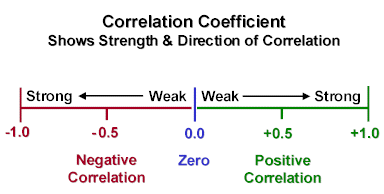 |
| Correlational Research |
Correlational Research is a non-experimental research
method. In this research method, there is no manipulation of an independent variable.
In correlational research, the
researcher studies the relationship between one or more quantitative
independent variables and one or more quantitative dependent variables; that
is, in correlational research, the independent and dependent variables are
quantitative.
It is important to stress that
correlations refer to measures of association and do not necessarily indicate
causal relationships between variables.
Mouly
puts it like this: “The correlation
simply implies concomitance; it is
not synonymous with causation. It may suggest causation in the same sense that
the variables involved are part of a cause and effect system, but the nature of
the system and the direction in which the components operate is not specified
in the correlation. The two variables are not necessarily (or perhaps even
commonly) the cause and effect of each other. The correlation between X and Y
is often nothing more than the reflection of the operation of a third factor.”
When correlational research is appropriate:
Correlational research is appropriate
in the following two instances:
First, it is appropriate when there is
need to discover or clarify relationships and where correlation coefficients
will achieve these ends. It is especially useful in this connection in the
initial stages of a project where a certain amount of basic groundwork has to
be covered to get some idea of the structure of relationships. In this way, it
gets at degrees of relationships which may become a source of hypotheses and
further research.
The correlational approach is also
valuable when variables are complex and do not lend themselves therefore to the
experimental method and controlled manipulation. It also permits the
measurement of several variables and their relationships simultaneously in
realistic settings.
Second, correlational research is
appropriate where objective, or one of a set of objectives, is to achieve some
degree of prediction. (prediction studies are appropriate where a firm basis of
previous knowledge is present, the assumption being that at least some of the
factors will relate to the behavior to be predicted).
Advantages of Correlational Research:
Correlational research is particularly
useful in tackling the problems of education and social sciences because it
allows for the measurement of a number of variables and their relationships
simultaneously.
The experimental approach, by contrast,
is characterized by the manipulation of a single variable and is thus
appropriate for dealing with problems where simple causal relationship exist.
In educational and behavioral research,
it is invariably the case that a number of variables contribute to a particular
outcome. Experimental research thus introduces a note of unreality into
research, whereas correlational approaches, while less rigorous, allow for the
study of behavior in more realistic settings.
Correlational research yields
information concerning the degree of relationship between the variables being
studied. It thus provides the researcher with insights into the way variables
operate that cannot be gained by other means.
Limitations of Correlational Research:
Correlational research only identifies
what goes with what—it only implies concomitance and therefore does not
necessarily establish cause-and-effect relationships.
It is less rigorous than the
experimental approach because it exercises less control over the independent
variables. It is prone to identify spurious relation patterns. It adopts an
atomistic approach.













